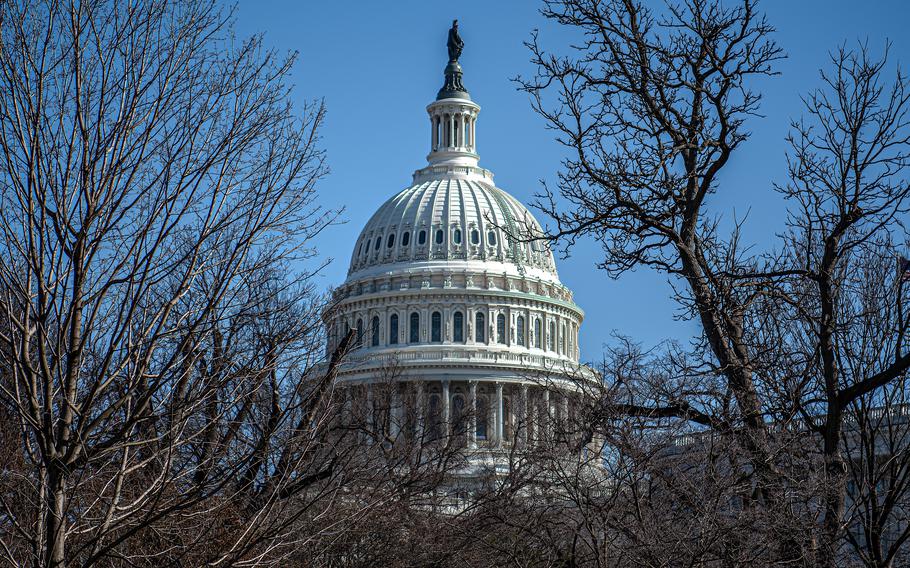
The U.S. Capitol building in Washington. (Stars and Stripes)
WASHINGTON — The House approved a $895 billion defense policy bill Wednesday that will provide a historic pay raise for junior enlisted troops while also limiting treatment for transgender children of service members.
A provision barring Tricare — the military’s health care program — from covering all gender-affirming care for minors had threatened to tank the annual National Defense Authorization Act, with Democrats voting en masse against it.
But the bill ultimately passed the Republican-controlled House in a 281-140 vote.
The legislation otherwise garnered widespread support for giving E-1 to E-4 troops a 14.5% pay raise and all other troops a 4.5% pay bump. The bill was also lauded for its investments in housing, child care, health care, spousal support and other quality-of-life improvements.
“No service member should have to live in squalid conditions. No military family should have to rely on food stamps to feed their children and no one serving in the military should have to wait to see a doctor. But that’s exactly what many of our service members are experiencing, especially junior enlisted personnel,” said Republican Rep. Mike Rogers of Alabama, the chairman of the House Armed Services Committee. “This bill goes a long way to fixing that.”
The bill now moves to the Senate, where it is also expected to pass, and is set to become law by the end of the year.
Lawmakers traditionally show bipartisan support for the must-pass authorization legislation, which sets policies for the Pentagon, but Democrats began withdrawing their endorsements earlier this week over the transgender provision.
The provision bars coverage of treatments “that could result in sterilization” for underage dependents who are suffering from gender dysphoria. An estimated 4,000 minor children of service members are receiving gender-affirming care.
Rep. Adam Smith of Washington, the top Democrat on the House Armed Services Committee, said he would oppose passage of the defense bill due to the provision, arguing it could be used to target access to puberty blockers and hormone treatment therapy.
He blamed House Speaker Mike Johnson, R-La., for forcing the provision into the defense bill in a move that he said upended congressional norms and politicized a typically bipartisan process.
“The inclusion of this harmful provision puts the lives of children at risk and may force thousands of service members to make the choice of continuing their military service or leaving to ensure their child can get the health care they need,” Smith said.
Johnson has defended the provision as a “critical and necessary step” to protect children from “radical gender ideology and experimental drugs.” Other Republicans have also come out in favor of the measure.
“Our veterans and active-duty military struggle to get their own necessary medical costs covered, and Tricare was expected to foot the bill for gender-affirming abuse?” Rep. Nancy Mace, R-S.C., wrote on X. “This should have never even been on the table.”
Rep. Austin Scott, R-Ga., on Monday lashed out at lawmakers who boycotted the defense bill and said they were exaggerating the intended reach of the transgender care provision.
“We are saying that we are not going to allow a surgical procedure on [children] that could result in sterilization,” he said. “These are permanent and irreversible procedures and they should not be allowed.”
But Democrats succeeded in blocking other culture war provisions in the bill. Measures previously approved by the House to end the Pentagon’s abortion travel policy, gut diversity, equity and inclusion offices and bar Tricare coverage of gender-transition procedures were all dropped.
The legislation retains a hiring freeze for diversity-related positions at the Defense Department and bars military academies from teaching critical race theory, an academic concept that argues racism is systematic.
It also maintains the registration process for Selective Service without expanding it to women and does not expand access to in vitro fertilization for service members and their families.
Quality-of-life issues are the focus of much of the legislation after the House Armed Services Committee convened a special panel this year to find solutions for high living costs, substandard military housing, limited access to child care, long wait times for medical care and spousal unemployment.
The panel made 32 recommendations and 29 of them were included in the final authorization bill.
They include the large pay raise specifically for junior enlisted service members, expanded access to the basic needs allowance, investments in new barracks and family housing, improved pay for child care staff and direct access to specialty medical providers without referrals.
The bill also allows military spouses to transfer professional licenses between states, authorizes the construction of more Defense Department schools and child care centers, and makes it easier for government service employees of the military to stay in their overseas jobs past a five-year term limit.
Lawmakers on Wednesday said they will continue to seek further improvements to troop morale and quality of life but the approved defense bill marked a significant leap forward.
“This is the most consequential and important piece of legislation of the entire 118th Congress,” said Rep. Chrissy Houlahan, D-Pa. “With this bill in law, our nation will be more secure, our servicemen and women more resolved to face the global challenges of tomorrow.”